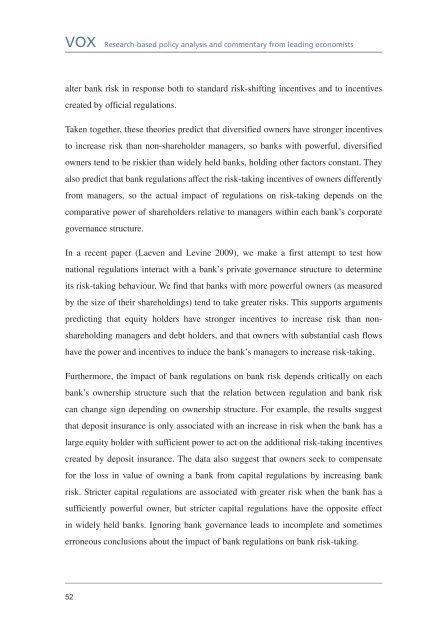You also want an ePaper? Increase the reach of your titles
YUMPU automatically turns print PDFs into web optimized ePapers that Google loves.
VOX Research-based policy analysis and commentary from leading economists<br />
alter bank risk in response both to standard risk-shifting incentives and to incentives<br />
created <strong>by</strong> official regulations.<br />
Taken together, these theories predict that diversified owners have stronger incentives<br />
to increase risk than non-shareholder managers, so banks with powerful, diversified<br />
owners tend to be riskier than widely held banks, holding other factors constant. They<br />
also predict that bank regulations affect the risk-taking incentives of owners differently<br />
from managers, so the actual impact of regulations on risk-taking depends on the<br />
comparative power of shareholders relative to managers within each bank’s corporate<br />
governance structure.<br />
In a recent paper (Laeven and Levine 2009), we make a first attempt to test how<br />
national regulations interact with a bank’s private governance structure to determine<br />
its risk-taking behaviour. We find that banks with more powerful owners (as measured<br />
<strong>by</strong> the size of their shareholdings) tend to take greater risks. This supports arguments<br />
predicting that equity holders have stronger incentives to increase risk than nonshareholding<br />
managers and debt holders, and that owners with substantial cash flows<br />
have the power and incentives to induce the bank’s managers to increase risk-taking.<br />
Furthermore, the impact of bank regulations on bank risk depends critically on each<br />
bank’s ownership structure such that the relation between regulation and bank risk<br />
can change sign depending on ownership structure. For example, the results suggest<br />
that deposit insurance is only associated with an increase in risk when the bank has a<br />
large equity holder with sufficient power to act on the additional risk-taking incentives<br />
created <strong>by</strong> deposit insurance. The data also suggest that owners seek to compensate<br />
for the loss in value of owning a bank from capital regulations <strong>by</strong> increasing bank<br />
risk. Stricter capital regulations are associated with greater risk when the bank has a<br />
sufficiently powerful owner, but stricter capital regulations have the opposite effect<br />
in widely held banks. Ignoring bank governance leads to incomplete and sometimes<br />
erroneous conclusions about the impact of bank regulations on bank risk-taking.<br />
52














